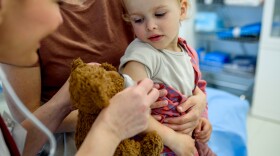
Kate Wells
ReporterKate Wells is a Peabody Award-winning journalist currently covering public health. She was a 2023 Pulitzer Prize finalist for her abortion coverage. Wells previously co-hosted Believed, a nine-part podcast series drawing millions of downloads and numerous awards. She and co-host Lindsey Smith received the prestigious Livingston Award for Young Journalists.
-
More than a dozen states, including Michigan, have sued the Trump administration over a federal declaration that would end funding for healthcare providers who offer gender-affirming care.
-
When the last clinic offering abortion in the Upper Peninsula closed, a local urgent care started offering abortion pills to help fill the gap. Now it could be a national model for a new kind of abortion access.
-
Hundreds of Michigan municipalities are eligible for nearly $25 million from drug manufacturers. But they have to apply before October 8.
-
Some 14,500 Medicaid patients in Michigan must now pay out-of-pocket or go elsewhere for services like cancer screenings and birth control. "For so many, they're just not going to get the care that they need," one provider said.
-
Not having this year’s COVID shot actually qualifies you to get the shot, the state’s chief medical executive announced Friday, because the state considers being unvaccinated an “underlying condition.”
-
Other states have issued orders authorizing the shots for virtually anyone who wants them, or requiring state insurers to cover the vaccine. Michigan's approach is "more measured," officials say.
-
New research by the organizers of Rx Kids, a universal cash aid program for new moms and babies in Flint, found families in the program were less likely to be evicted or report postpartum depression.
-
Some 14,000 Michigan patients who rely on Medicaid will be affected, Planned Parenthood of Michigan said Friday.
-
The laws allow concerned family members, healthcare providers, and law enforcement to seek a court order temporarily barring someone from possessing guns, if they believe they're an imminent threat.
-
If you're under 65 and healthy, you're going to have to attest to having an underlying medical condition (like pregnancy, obesity, or a mental health condition) that would qualify you as "high risk."










